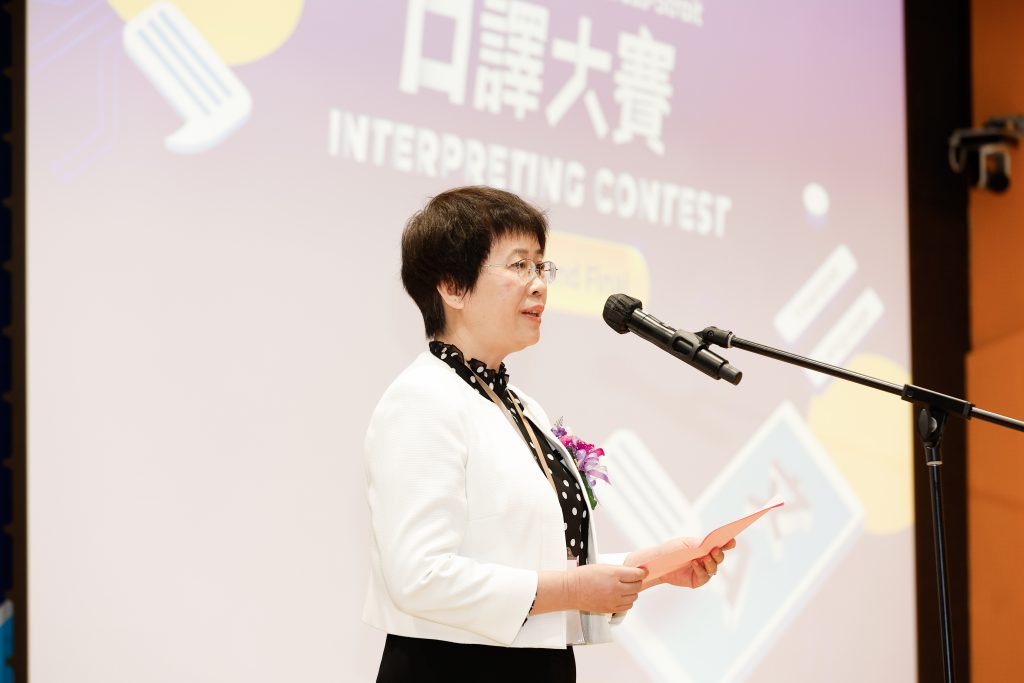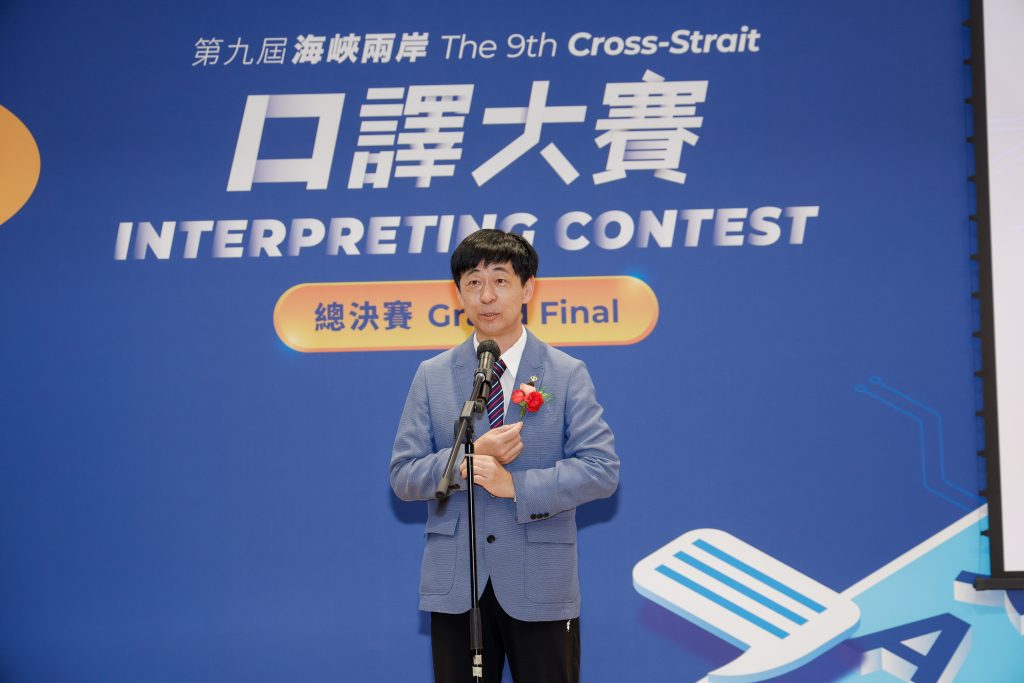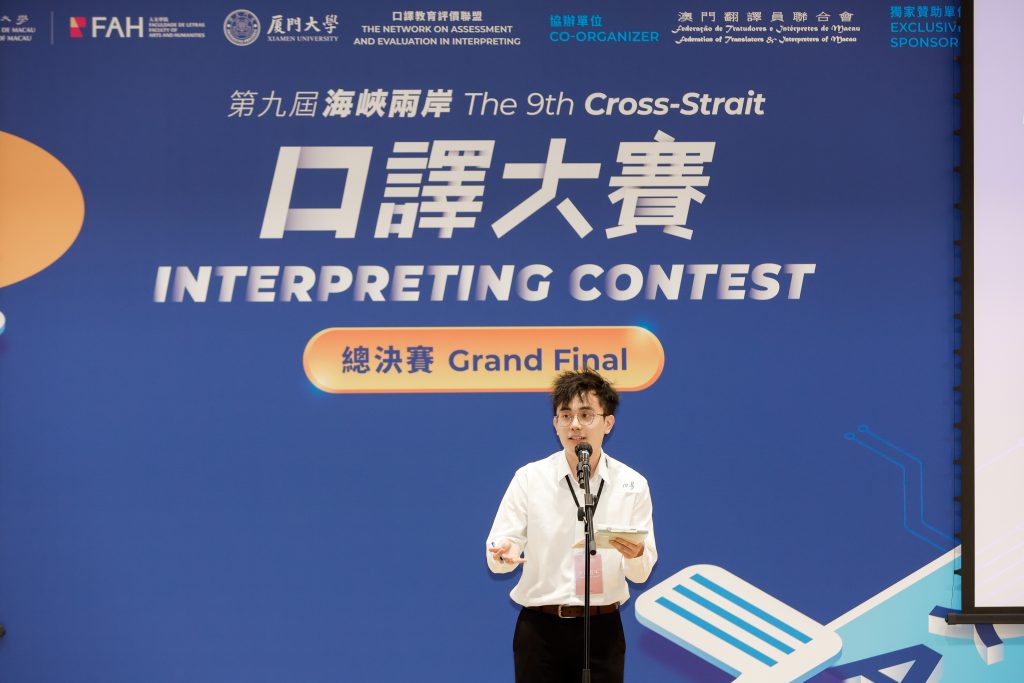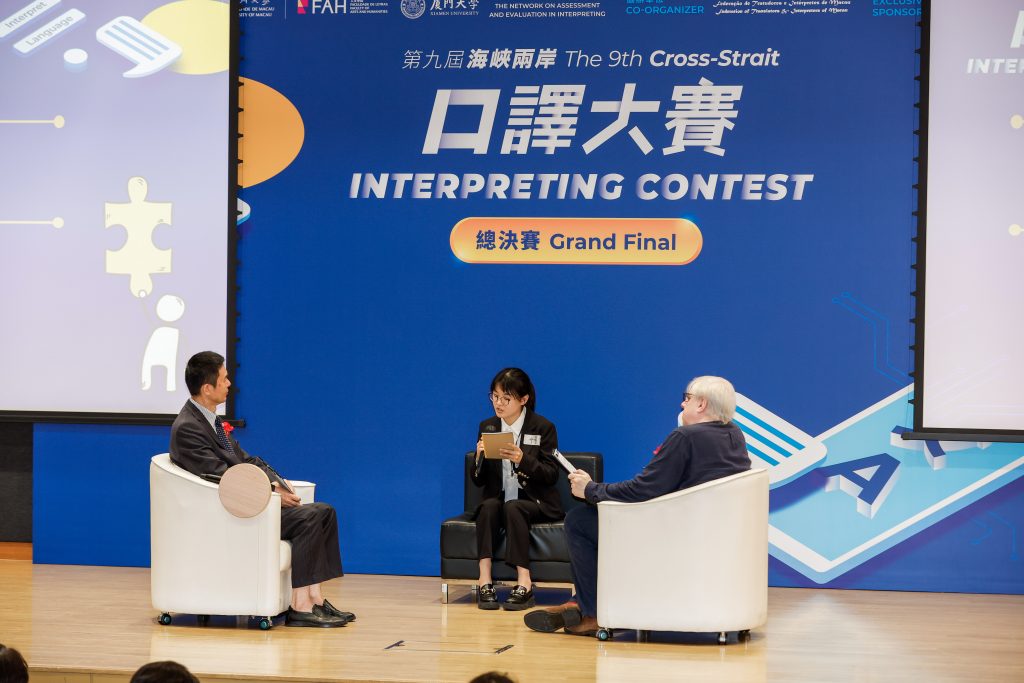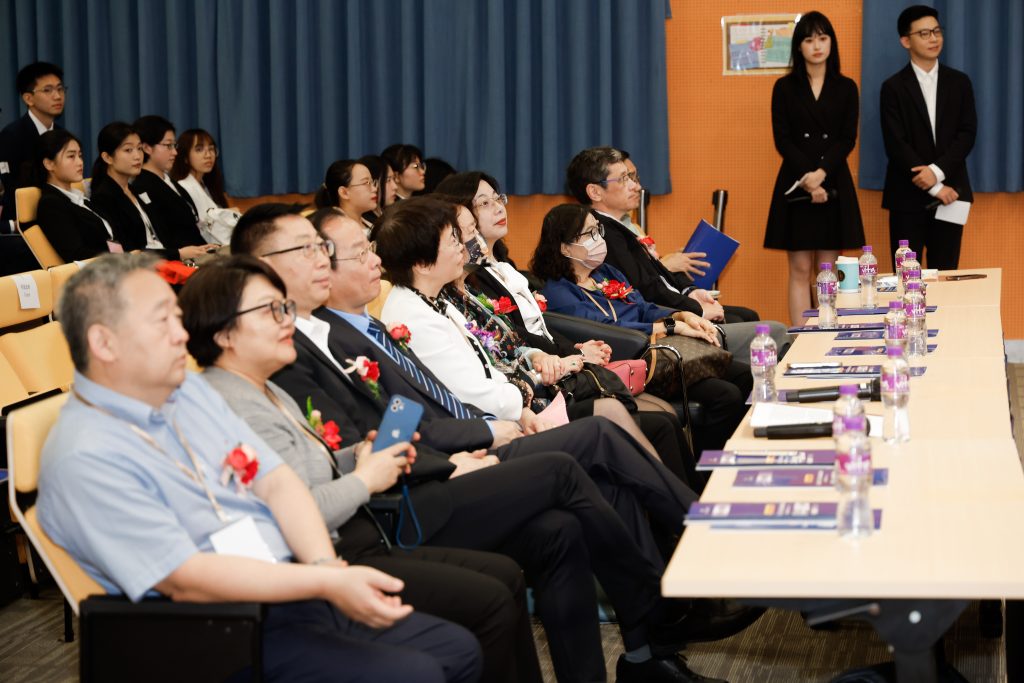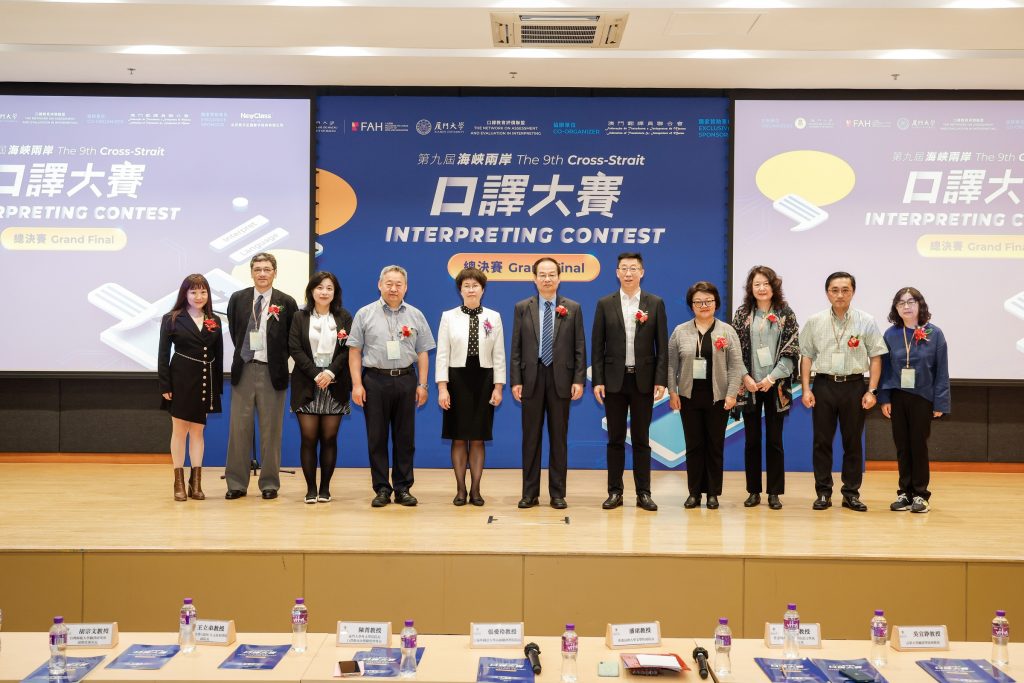
A group photo of the judges and representatives of the organising committee
The Ninth Cross-Strait Interpreting Contest Grand Final was held at the University of Macau (UM). The event was co-organised by the Faculty of Arts and Humanities (FAH) of UM, the College of Foreign Languages and Cultures of Xiamen University, the Network on Assessment and Evaluation in Interpreting, and the Macau Federation of Translators and Interpreters. The Cross-Strait Interpreting Contest is one of the most prestigious interpreting contests in China. The participating students this year have performed very well and received praise from experts in related fields.
In his speech, UM Vice Rector Ge Wei stressed the significance of interpreting for Macao’s economy. He said that Macao is known for its thriving tourism industry, and every year, Macao hosts many exhibitions and conferences in which interpreting plays an important role. Interpreting is vital for driving economic growth, promoting technological advancements, and facilitating the exchange of cultural and intellectual values.
Wang Gang, director of Macau Office of Association for Relations Across the Taiwan Straits also pointed out that the contest has facilitated an important exchange of knowledge among talent across the Greater China region after several years of pandemic, adding that he looks forward to more contacts in the Greater China region.

Ge Wei
Gao Anming, vice president and editor-in-chief of China International Communications Group and executive vice president of the Translators Association of China, and Tang Wensheng, renowned translator, former vice-chairman of the All-China Federation of Returned Overseas Chinese, gave a pre-recorded speech respectively. Gao said that the Cross-Strait Interpreting Contest is a prestigious nation-wide event which serves as a platform to promote exchanges between university students from the Chinese mainland, Hong Kong, Macao, and Taiwan. He further remarked that through the contest, a number of highly capable interpreters with professionalism, cross-cultural communication skills and global outlook have come to the fore, and they will play a role in strengthening China’s translation capacity and facilitating its international exchanges. Tang said that through translation, Chinese speakers can communicate with others in their mother tongue, adding that translation forms an indispensable bridge between China and those who speak other languages. She mentioned that translation is not an easy task, as it requires one not only to be proficient in both languages, but also to understand their cultures. She emphasised that the future belongs to young people who yearn to excel.
Chen Jing, dean of the College of Foreign Languages and Cultures at Xiamen University, said that the Cross-Strait Interpreting Contest provides an excellent opportunity for interpreters to gather and exchange valuable ideas, adding that she was touched by the launch of the contest, the enthusiasm of the inaugural organisers of the contest that influences future generations, as well as the development of the contest and the effort of its previous organisers. She also expressed her excitement about the future of the contest and the possibilities for interpreters. She mentioned that at the roundtable seminar hosted by FAH at UM the day before the contest, she witnessed an enthusiastic discussion and sharing among talent in the field of interpreting. She believes that in the future, the Cross-Strait Interpreting Contest will see more interpreting students become top members and leaders in the field.
Li Defeng, associate dean of FAH at UM, said that as a multilingual and multicultural city, Macao has always been a gateway for international endeavours, and the importance of interpreting training and profession cannot be overlooked. Learning how to interpret accurately and efficiently can be an essential catalyst for communication, intercultural exchanges and better understanding between people. He also commented on the influences brought by technological innovations, noting that artificial intelligence has enabled practitioners to achieve unprecedented levels of efficiency and accuracy in translation, but it cannot replace the experiential knowledge and intuitive understanding that only human interpreters can provide. Therefore, it is necessary to continue to invest in nurturing talented interpreters who can help address cultural and linguistic barriers, promote mutual understanding, and contribute to a better future for all.
The grand final gathered 24 contestants from different universities across the Greater China region who are winners of regional interpretation contests, and was divided into three rounds. In the first two rounds, contestants were evaluated based on their performances in Chinese-English gist interpreting and English-Chinese conference interpreting, respectively. The 12 contestants with the highest scores in the first two rounds advanced to the third round, which took the form of dialogue interpreting to evaluate the contestants’ ability to interpret in both directions for Chinese and English conversation. The judging criteria included the ability to extract and transmit information, the quality of interpretation, presentation skills, as well as the quality of communication and the overall performance.
After three rounds of competition, Tang Xuewen from Beijing Foreign Studies University won the grand prize; Gao Xin from Central South University, Shen Hsieh-Tao from Taiwan Normal University, and Li Lingfei from Middlebury Institute of International Studies at Monterey were awarded the first prize. He Chengmingjie from China Foreign Affairs University, Wang Xiaojing from Huazhong University of Science and Technology, Liu Xingyang from Dalian University of Foreign Languages, Luk Cheuk Wang from The Chinese University of Hong Kong, Chen Hsi from Taiwan University, Huang Yutong from Wuhan University, Xu Yifei from UM, Zhang Yuting from Zhejiang University were awarded the second prize. Liu Pei-Chen and Lai Jhao-Ling from Taiwan University, Jau Hou Laam from The University of Hong Kong, Jiang Shan from The Chinese University of Hong Kong, Shenzhen, Xiong Lingsong from Chongqing Medical University, Xiao Ying from Xiamen University, Yu Cheng-En from Soochow University, Mak Hoi Kiu from the City University of Hong Kong, Chan Un Ieng from UM, Anunciata Trixie Peni from Wenzao Ursuline University of Languages, Xu Yiru from Chongqing Normal University, and Yang Han from Macao Polytechnic University were awarded the third prize.
Experts across the Greater China region served as judges at the grand final. They included Chen Jing, dean of the College of Foreign Languages and Cultures, Xiamen University; Zhang Ailing, dean of the Graduate Institute of Interpretation and Translation, Shanghai International Studies University; Wang Lidi, associate dean of the School of Humanities and Social Science, Chinese University of Hong Kong, Shenzhen; Pan Jun, associate dean (research) of the Faculty of Arts, Hong Kong Baptist University; Daniel Hu, chair and associate professor of the Graduate Institute of Translation and Interpretation, Taiwan Normal University; Yan Xiu, coordinator of master’s programmes in the Department of Linguistics and Translation, City University of Hong Kong; Wallace Chen, head of the Chinese translation and interpretation programme, Middlebury Institute of International Studies at Monterey; Sally Wu, assistant professor of translation studies at Chang Jung Christian University; and Victoria Lei, assistant dean of FAH, UM.

A group photo
- 澳門大學副校長 葛偉 Ge Wei, UM Vice Rector
- 澳門大學人文學院副院長 李德鳳 Li Defeng, Associate Dean of FAH at UM
- 廈門大學外文學院院長 陳菁 Chen Jing, Dean of the College of Foreign Languages and Cultures at Xiamen University
- 海峽兩岸關係協會駐澳門辦事處主任 王剛 Wang Gang, director of Macau Office of Association for Relations Across the Taiwan Straits
- 中國外文局副局長兼總編輯、中國翻譯協會常務副會長 高岸明 Gao Anming, vice president and editor-in-chief of China International Communications Group and executive vice president of the Translators Association of China
- 著名翻譯家、中國翻譯協會顧問、前副會長、中國僑聯顧問、前副主席唐聞生
- 選手賽中風采 Contestant
- 選手賽中風采 Contestant
- 評委及嘉賓 Judges and Guests




